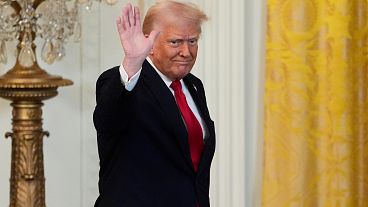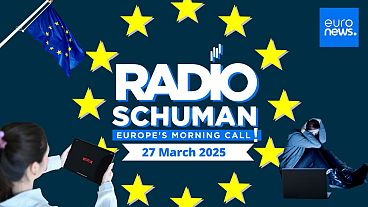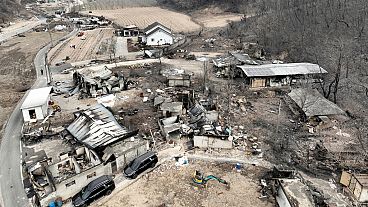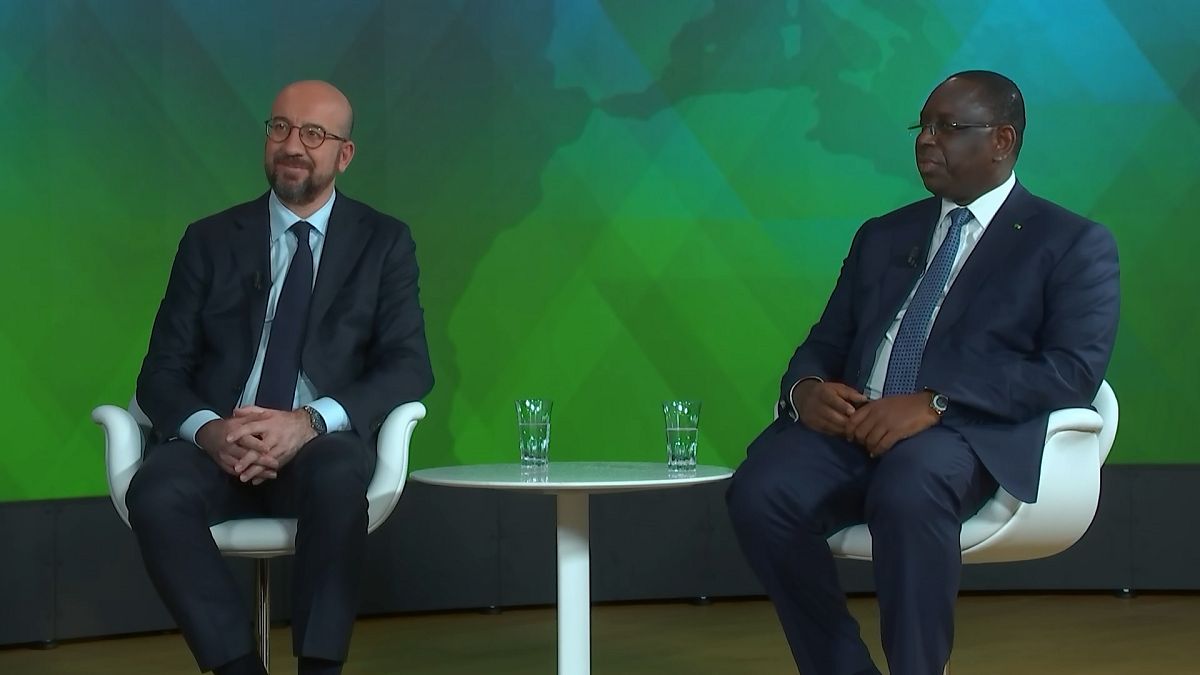The European Union and the African Union are renewing their partnership to set a common vision for 2030. Euronews and Africanews talk to European Council President, Charles Michel and Chairperson of the African Union & President of Senegal, Macky Sall.
The European Union and the African Union are renewing their partnership to set a common vision for 2030.
Following the summit in Brussels, the European Council President, Charles Michel and the President of Senegal & Chairperson of the African Union spoke with Euronews's own Gregoire Lory and Africa News's Nathalie Wakam on The Global Conversation.
Nathalie Wakam:
Charles Michel, the first objective of this summit, was to reshuffle the cards a little. Are you fully satisfied with what has been achieved over these two days in Brussels?
Charles Michel:
I am very satisfied because I have the conviction that during these few hours in Brussels, during these two days in Brussels, we have truly redesigned and renewed the partnership between Africa and Europe, we have changed the paradigm. And the preparation of the summit, already displayed this desire for a common political will. How can we identify together the goals and challenges? Moreover, how can we identify together the best solutions with more pragmatism, while being more efficient, more practical? So these principles of mutual respect, mutual interest, these principles of regular evaluations ensure that we can really deliver on our commitments.
Grégoire Lory :
Macky Sall, do you think that it is possible to build this renewed partnership?
Macky Sall:
Absolutely. As Charles said, this summit has allowed us to achieve this result which will be the starting point of this renewed and rethought partnership. It will be based on mutual respect, solidarity and finally, listening to each other because often we were not listened to. We were just given recipes, solutions. I note this fundamental paradigm shift in the relationship, built on friendship, consideration, mutual listening and the search for common solutions, the co-construction of solutions.
In addition, when we came to Brussels, of course, there were delicate subjects on which we had not yet finished negotiating: the question of the energy transition, the climate transition, the questions of property rights in relation to vaccines, these are difficult subjects, which we have more or less succeeded in fixing. Therefore, regarding the work method, it was a major innovation and it gave us greater efficiency and finally led to quite convincing results. Now there remains the implementation, on which we have also committed ourselves.
Nathalie Wakam:
Macky Sall, The management of the Covid Pandemic has strained relations between the African Union and the European Union. There was omicron and the decisions made in its wake. Now there is the pressing issue of lifting the vaccine patents. Clearly, you have not obtained satisfaction. Is this a failure?
Macky Sall:
No not at all. It is not at all a failure. I mean, when there are two opposing positions, we try to reach a compromise, a solution that could satisfy both parties. We are not in a Manichean relationship where it is yes or no. No. Already, to achieve the desired result, that is, to have at least 60% of the vaccines produced in Africa; Europe has made efforts.
First-of-all, the availability of vaccines on covax, whatever one may say. Already 150 million doses that have been given. Furthermore, Europe is committed to providing 400 million doses by the summer of 2022. That is the first step. However, we are saying that receiving doses is not enough. We want to produce the doses in Africa. Within this context, there has been an extremely important exchange where European countries and Team Europe made a commitment with us, with the WHO, to transfer initially to six African countries, six hubs: the new technology of messenger RNA.
And within this framework it is important to discuss the subject of Patents. The patents, some are saying, should be suspended. That is one side. Others are saying we cannot question intellectual property. So, what should we do? We have a pandemic. People are dying during this pandemic. We are going to and we have given, a mandate to the two commissions: the European Union and the African Union, and the WTO will accompany us so that we can find a compromise. And, the compromise is first of all the transfer of technology.
Once we have the technology, it is easier to discuss with the person who has the patent, perhaps to improve the conditions, to reduce the costs so that those who have the technology can reproduce on the continent. So this debate is postponed until April-May and I think that we cannot say that it is a failure.
Nathalie Wakam:
So let's talk a little bit about the security issue. France has announced a coordinated withdrawal of Barkhane and Takuba. You reacted, saying you were happy that this commitment was renewed. Concretely, what will we see in this region the coming months?
Macky Sall:
First of all, it is important to note that we had an extremely important exchange at the Élysée Palace the day before yesterday, Charles Michel was there, with the European and African leaders on the issue of security and the fight against terrorism. During this debate, which is also a frank debate, you know, things are said clearly, bluntly, but with respect; it appears that Europe does not want to leave Africa alone to face terrorism. This is a good thing.
We would like all parts of the world to think like this because if everyone reasoned like this, Africans would not face terrorism alone. When it came to terrorism in Afghanistan or Syria, global coalitions mobilized, thousands of billions of dollars were mobilized for twenty years in Afghanistan. Why is it that when it comes to Africa, we are told to deal with it on our own? However, there have been a few countries; France is one of those countries, which responded to Mali’s call in 2013. Africans responded before the UN even set up a blue helmet mission. Our different countries sent their soldiers for free. I remember my soldiers drove from Dakar, 2,300 kilometres to help Mali because it was one of our neighbours.We would like this type of solidarity to be global and it is good that Europe has renewed this solidarity with Africa.
Gregoire lory:
Do the failures of the French Barkhane mission and the European Takuba mission call into question this format of intervention and could call into question other European interventions?
Charles Michel:
I disagree with your analysis, because it is crucial to remember the starting point. The starting point was the threat of the total collapse of Mali, with implications for the entire region and beyond. And it is because sovereign states considered that it was useful to have the partnership with France and the European countries, that the decision was taken to deploy in support to try to avoid what would have been a much more serious catastrophe than the current situation. Secondly, we are taking into consideration the evolution of the threat, and the situation in Mali, which, as mentioned earlier, is causing difficulties. We hope we will be able to return as soon as possible, to a more normalized form of cooperation with this country, which is an important country in the heart of the Sahel. But we are also adapting through the re-coordination that has been explained.
We are also engaged in a full dialogue with African countries, taking into account, for example, the Accra initiative and the importance of also taking into consideration the countries of the Gulf of Guinea, who had representatives at the Elysée meeting. Therefore, we had European and African countries at the table. It was an opportunity for a direct exchange, a joint analysis of the situation, and based on this joint analysis, we see how we can deploy in an operational manner once again. As Europeans, we try to deploy the most logical and useful means, following the analyses made by our African friends.













